The mission of Preble Street is to provide accessible barrier-free services to empower people experiencing problems with homelessness, housing, hunger, and poverty, and to advocate for solutions to these problems.
In 1975, Preble Street was founded as a neighborhood center to involve and empower homeless and low-income residents in Portland. Today, Preble Street is a statewide hub of services and compassion for some of the most vulnerable and underserved people in Maine.
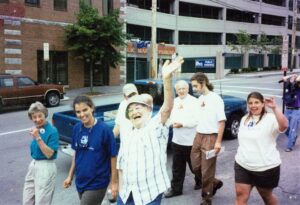
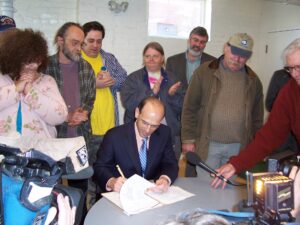

1975
THE BEGINNING
Preble Street launches as the High Street Resource Center, a neighborhood center that empowers residents experiencing poverty and homelessness. Founder Joe Kreisler starts the agency as a real-world training ground for students at the University of Southern Maine School of Social Work and a place for some of Portland’s most vulnerable residents to get help meeting their needs and advocating for change.

People of Preble Street: Joe Kreisler
Joe dedicated his life to addressing the needs of disenfranchised people and was the embodiment of the agency’s mission, philosophy, spirit, and dedication to meeting everyone as an equal human being.
1981
ESTABLISHES PRESENCE IN BAYSIDE NEIGHBORHOOD
After moving to the basement of the Preble Street Chapel in the Bayside neighborhood, the agency is renamed the Preble Street Resource Center. Clients receive meals, case management, and access to healthcare, employment counseling, clothing, bathrooms, mail, laundry, and more.
1985
BREAKS FROM UNIVERSITY
Preble Street breaks from the University of Southern Maine to become a stand-alone 501(c)(3) non-profit and establishes its first Board of Directors.
1993
STRENGTHENS SERVICES
Expanding its hours and services, the Preble Street Resource Center moves to 5 Portland Street. To better serve people in need, Portland’s scattered meal programs consolidate in one location at the Resource Center Soup Kitchen, serving more than 250 people each day.

Preble Street Resource Center
For 27 years, the Preble Street Resource Center was the hub of services for the agency. The holistic approach of providing social care and casework services while meeting concrete needs for food, clothing, and shelter still serves as a model for our current programs.
1995
LAUNCHES HOMELESS VOICES FOR JUSTICE
Joe Kreisler taught that true solutions can only be found when people who experience the issue are part of the solution. Initially known as the Consumer Advocacy Project, Homeless Voices for Justice is created as a statewide, grassroots, social change movement, organized and led by people who have experienced homelessness, hunger, and poverty. This expansion cements the importance of advocacy to Preble Street’s work.
1996
BEGINS DEDICATED YOUTH PROGRAMMING
Replicating the successful model of the Preble Street Resource Center, the Teen Center opens to meet the immediate needs of homeless and runaway youth — providing warmth and safety, on-site school, meals, clothing, and crisis intervention — and the opportunity to develop life skills that promote stability and independence. Over the next few years, Preble Street builds a state-of-the-art facility for youth-specific services including specialized health care, employment services, mental health and substance use counseling, and an education center.
2004
EXPANDS YOUTH SERVICES TO 24/7
Building its commitment to youth experiencing homelessness, Preble Street takes over operations of the 16-bed Lighthouse Shelter facility for teens experiencing homelessness.

Preble Street Teen Services
Today, Preble Street Teen Services has expanded to include the Teen Center, Teen Shelter, Teen Housing, and Teen Outreach. These programs provide services for youth experiencing homelessness between the ages of 12-24 in Maine. We are proud to work alongside and in support of these young people as they move toward their goals of independence, stability, and safety.
2005
OPENS FIRST SITE-BASED HOUSING FIRST PROGRAM IN MAINE
Preble Street partners with Avesta Housing and the Portland Housing Authority to open Logan Place, the first Site-based Housing First apartment community in Maine, and one of the first in the nation. Logan Place provides permanent supportive housing for individuals experiencing chronic homelessness.

People of Preble Street: Bruce Logan
Bruce believed that there should be no barrier between a person and a home. He was on the staff or Board of Preble Street for 12 years, lending his keen intellect to help develop some of the agency’s most innovative programs. Bruce had a big heart. Logan Place is named in honor of Bruce Logan, his ideals, his spirit, and his love.
2007
CREATES DEDICATED SHELTER FOR WOMEN
When Portland’s YWCA closes its doors, Preble Street strongly advocates for the 68 women who had nowhere to go and creates a dedicated emergency shelter.
2010
OPENS SITE-BASED HOUSING FIRST PROGRAM FOR WOMEN
Building on the success of Logan Place, Preble Street partners again with Avesta Housing and the Portland Housing Authority to create Florence House, a second Site-based Housing First apartment community, this time specifically for women. Florence House also now houses the emergency shelter for women.

People of Preble Street: Florence Young
Florence House is named for Florence Young, who believes in the value and worth of every single human being, regardless of circumstances and status. She was a key contributor to the beginnings of the agency, starting the hard and important work of implementing our mission. In her time at the agency, she served as a social work student intern, a staff member, and a Board member.
2011
INITIATES VETERANS HOUSING SERVICES
Preble Street, in conjunction with Pine Tree Legal Assistance and other agencies, creates Veterans Housing Services, a program to end Veteran homelessness in Southern Maine by assisting low-income Veterans and their families to find and maintain stable housing.
2013
EXPANDS VETERAN HOUSING SERVICES GEOGRAPHICALLY
Because of its early successes, Preble Street is asked by the Veterans Administration to expand programs for Veterans to Bangor, Lewiston, and beyond. This is the first time Preble Street offers services in the northern portion of the state.
OPENS NEW TEEN SHELTER
The new Joe Kreisler Teen Shelter provides many crucial upgrades over the old Lighthouse Shelter, expanding the agency’s capacity to provide shelter and safety for youth.
CREATES DEDICATED RESOURCES FOR TRAFFICKING SURVIVORS
Preble Street Anti-Trafficking Services is created to meet the needs of survivors of human trafficking in Southern Maine, providing outreach, healthcare, legal services, housing assistance, and case management.

Geographic expansions
Though Preble Street began as a small program serving a portion of neighborhoods in Portland, the agency has expanded its geographic footprint over the year. Today, Preble Street programs serve the entire state of Maine.
2014
INTRODUCES FIRST PLACE PROGRAM
First Place, an innovative transition-in-place housing program for youth experiencing homelessness, offers apartments and case management in collaboration with community landlords to help young people overcome obstacles to stable housing and build brighter futures.
2015
PIVOTS TO SAVE LIVES DURING THE OPIOD EPIDEMIC
During the year that ushered in Maine’s opioid epidemic, hundreds of Mainers died. Preble Street grieved over the loss of clients, friends, family, and staff. Leading advocacy efforts to legalize and normalize community use of Naloxone, Preble Street ensured that lifesaving materials and practices were integrated in all programs.
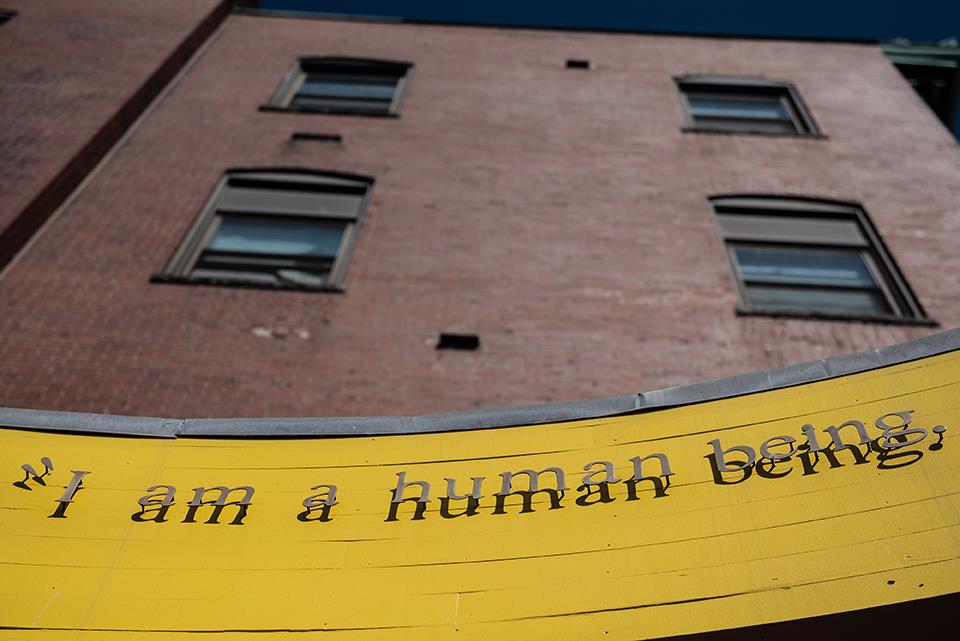
Harm reduction
Living in high stress situations, with limited access to healthcare makes people experiencing homelessness particularly vulnerable to substance use disorder and overdoses. Harm reduction practices, like safe supplies, Narcan, and honest, nonjudgemental conversations about use and recovery, are crucial to the well-being of people with substance use disorder and save lives. Harm reduction is a key part of social work practice at Preble Street programs.
2016
CONNECTS VULNERABLE MAINERS TO HEALTHCARE
The MaineHealth-Preble Street Learning Collaborative, in partnership with Tufts Medical School, opens to ensure that unhoused, vulnerable people in Portland have access to quality, barrier-free healthcare.
2017
EXPANDS SITE-BASED HOUSING FIRST TO 85 APARTMENTS
The third Site-based Housing First program in Portland, Huston Commons, opens its doors, providing efficiency apartments and essential 24/7 support services. Huston Commons incorporates current knowledge of trauma-informed care to inform the design of a community space which reflects the needs of staff and tenants.
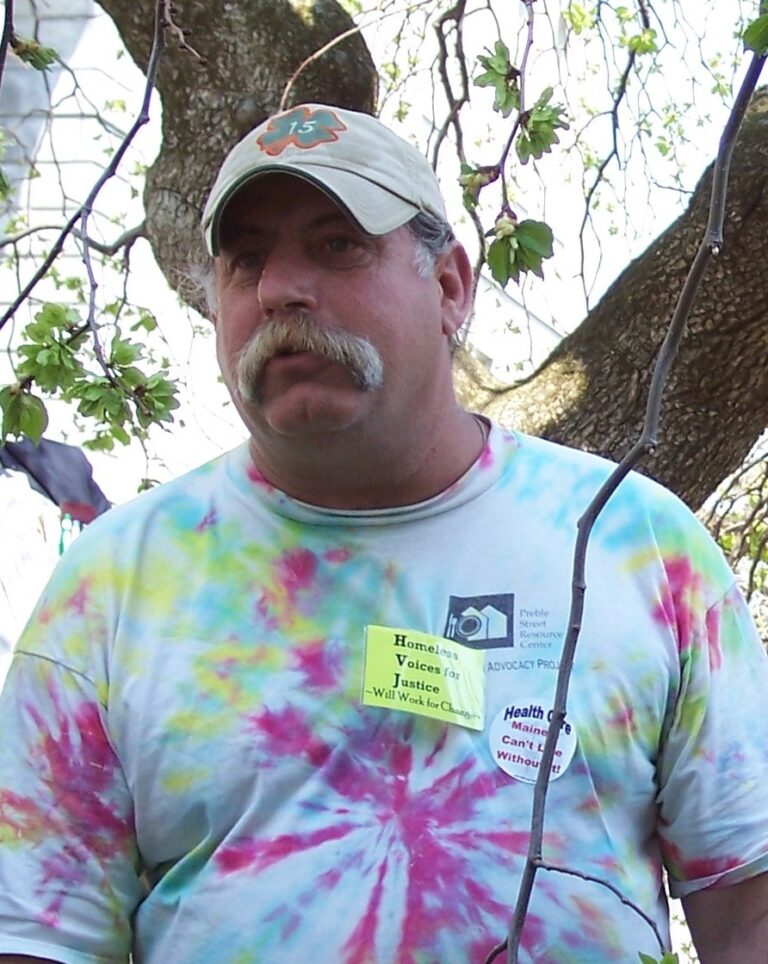
People of Preble Street: Steve Huston
Huston Commons is named in memory of Steve Huston. A Preble Street staff person who had spent years homeless himself, Steve fervently believed that every person deserves the dignity of a home. He was a compelling advocate for social justice and his passion was a commitment to speak for people who are maligned and marginalized.
2019
EXTENDS ANTI-TRAFFICKING SERVICES STATEWIDE
With the addition of additional casework staff at the Preble Street office in Bangor, Anti-trafficking Services expands to empower more survivors of human trafficking to reclaim their lives.
PREBLE STREET RESPONDS TO THE PANDEMIC
2020
RESPONDS TO URGENT COMMUNITY NEEDS
Innovative solutions help Preble Street to safely shelter and feed people in the midst of the pandemic. Partnering closely with the state, life-saving solutions include standing up a socially-distanced shelter in the University of Southern Maine’s Sullivan Gymnasium, and a Quarantine Shelter and a Temporary Emergency Shelter utilizing unoccupied hotels. The launch of the Street Outreach Collaborative, offering mobile social work services and meals 365 days a year in Portland, helps to reach people who are unsheltered.
LAUNCHES RAPID RE-HOUSING INTERVENTION
Following in the footsteps of Preble Street’s advocacy for casework services to meet the needs of unhoused people, the Rapid Re-Housing program opens, using evidence-based interventions that utilize casework and financial assistance to help individuals and families experiencing homelessness return to housing quickly.
2021
REIMAGINES HUNGER RELIEF
In response to a drastic increase in the need for emergency food services and informed by learnings from the pandemic, Preble Street reimagines how to address hunger in Maine. The first steps are made to establish a new Food Security Hub – a sustainable, comprehensive, and collaborative approach dedicated to hunger relief and advocacy to end hunger in Maine.
HEALING CENTER OPENS
Preble Street Anti-Trafficking Services moves to a new, large, peaceful space where survivors of human trafficking receive comprehensive services.
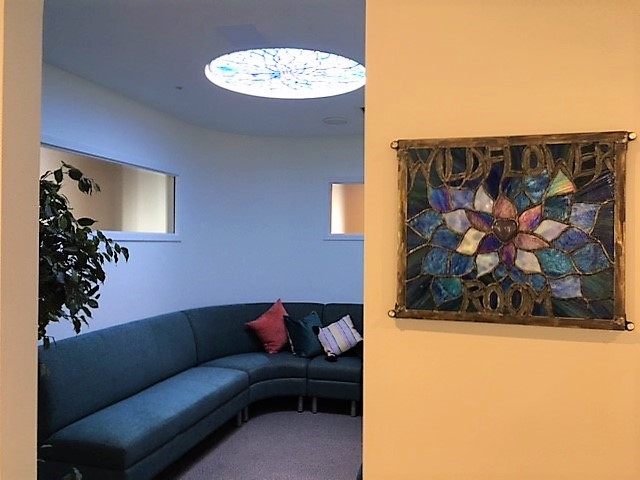
The Preble Street Healing Center
The Healing Center opened to allow the Anti-Trafficking Services program to provide more comprehensive services to meet the complex needs of survivors. In this safe, peaceful space, clients meet with their Preble Street case worker or use private rooms to meet with their other providers. They use technology for housing and employment searches, participate in survivor-led yoga classes or art therapy, or take time to rest in the Wildflower room.
2022
PARTNERS FOR MAINE’S FIRST MEDICAL RESPITE PROGRAM
For individuals who lack stable housing, being discharged from the hospital can be a vulnerable time and can lead to poor health outcomes. In partnership with Greater Portland Health and Maine Medical Center, Preble Street delivers Maine’s first Recuperative Care Program, offering 16 beds and around the clock care, to address this unmet need in the community.
ESTABLISHES NEW BEST PRACTICES SHELTER
Informed by best practices in the response to the COVID-19 emergency, Elena’s Way, a Preble Street Wellness Shelter, opens to provide warmth, safety, and intensive services to up to 40 people of all genders experiencing homelessness and complex physical and behavioral health needs who cannot access any other shelter.

People of Preble Street: Elena Schmidt
Elena’s Way is named for Elena Schmidt, who truly embodies Compassion in Action. Without Elena, Preble Street would not be the organization we are today. In her decades at the agency, her wisdom, heart, and values-based skills helped Preble Street grow and expand to serve the people who need it most.
2025
TAKES ON 24/7 SHELTER IN BANGOR
Preble Street Hope House is the first 24/7 program for Preble Street outside of Portland. This low-barrier emergency shelter, operated by another organization before 2025, was going to close due to financial considerations. Through Preble Street’s successful advocacy, new funding was created, and Hope House joined Preble Street’s Veterans Housing and Anti-Trafficking Services in providing services in northern Maine.
FULFILLS VISION FOR STATEWIDE HUNGER SOLUTIONS
The Food Security Hub expands with a capacity to make up to 10,000 meals per day and store up to 50,000 frozen, prepared meals for emergency response. Anti-hunger partners work together at the Food Security Hub, leading to stronger collaborations and more unified anti-hunger advocacy.

Food Security Hub
Taking lessons from the pandemic and the increase in food insecurity, Preble Street knew we needed to create innovative ways to end hunger in Maine. The goal of the Food Security Hub is to create a comprehensive emergency food system that extends the life of food, reduces food waste, creates more access to culturally appropriate meals, and provides more sustainable and nutritious food.
